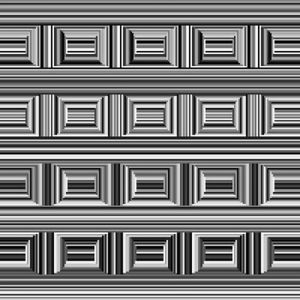Priming
Priming occurs when an individual's expectation of a stimulus taints the experience of a stimulus. For example, exposing someone to the word "yellow" will evoke a faster response to the word "banana" than it would to unrelated words like "television." Because yellow and banana are more closely linked in memory, people respond faster when the second word is presented.

Another example is this picture to the right that contains 16 squares aligning horizontally called the Coffer Ambiguous Figure (See Figure 1). Which would also show 16 circles aligned horizontally if you head this statement the other way around (click the link for an explanation).
Psychedelic Priming Technique
When people take a psychedelic a neuroplastic state develops where suggestivity is greatly increased. By using specific priming techniques and the user can be nudged into a desired, therapeutic direction.
Safety First
A tragedy of the War on Drugs is that psychedelics have been erroneously labelled as all bad. As there is a potential for difficult, challenging material to arise and present itself to the psyche this priming can make thing worse so this must primarily be addressed. One way to effectively do this is to enter a conversation about the rigorous, referenced scientific information about psychedelics presented on this site.
Set High Expectations
This can be used by therapists in a clinical setting administering psychedelics by utilising the Pygmalion effect, which is a psychological phenomenon in which high expectations lead to improved performance in a given area[1].
References
- ↑ Modalities of the psychedelic experience: Microclimates of set and setting in hallucinogen research and culture. Ido HartogsohnFirst Published July 12, 2022 Research Article. https://doi.org/10.1177/13634615221100385